unit 4 Body language[下学期]
文档属性
| 名称 | unit 4 Body language[下学期] |

|
|
| 格式 | rar | ||
| 文件大小 | 186.4KB | ||
| 资源类型 | 教案 | ||
| 版本资源 | 人教版(新课程标准) | ||
| 科目 | 英语 | ||
| 更新时间 | 2005-09-09 00:00:00 | ||
图片预览


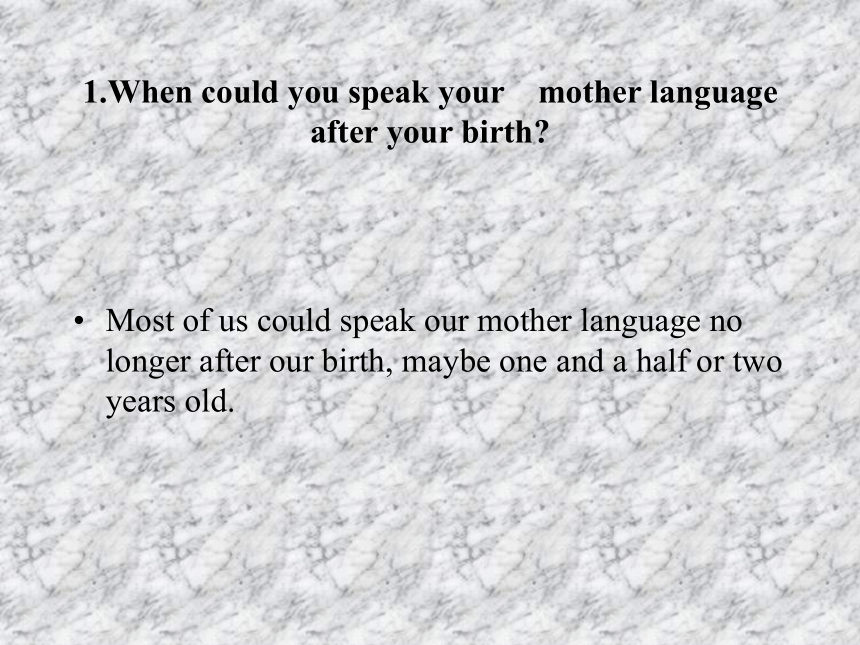
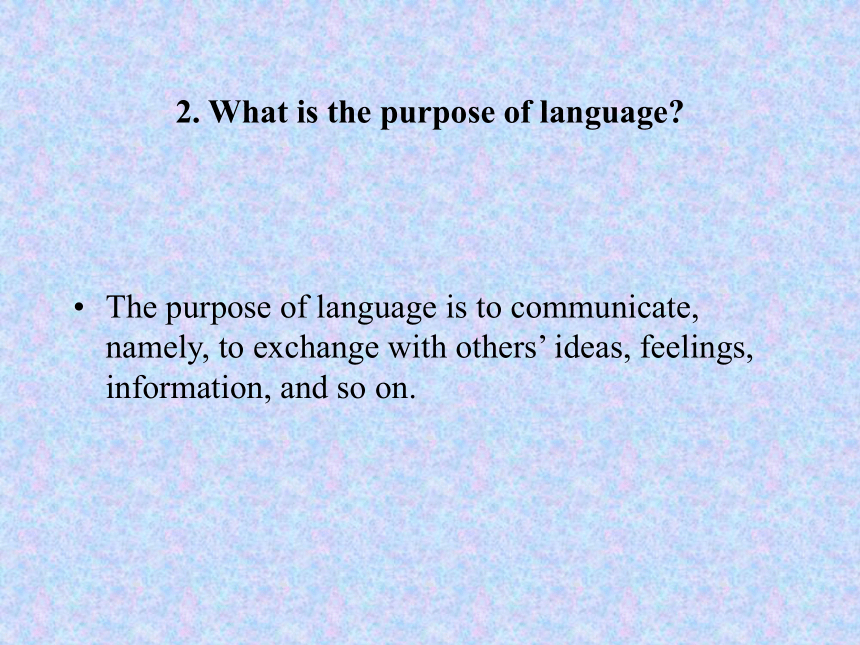
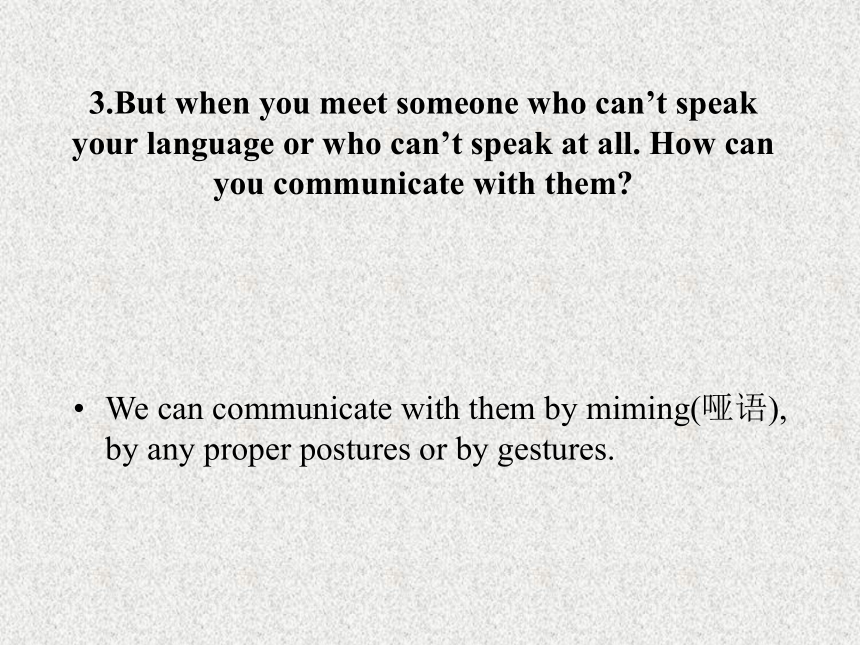
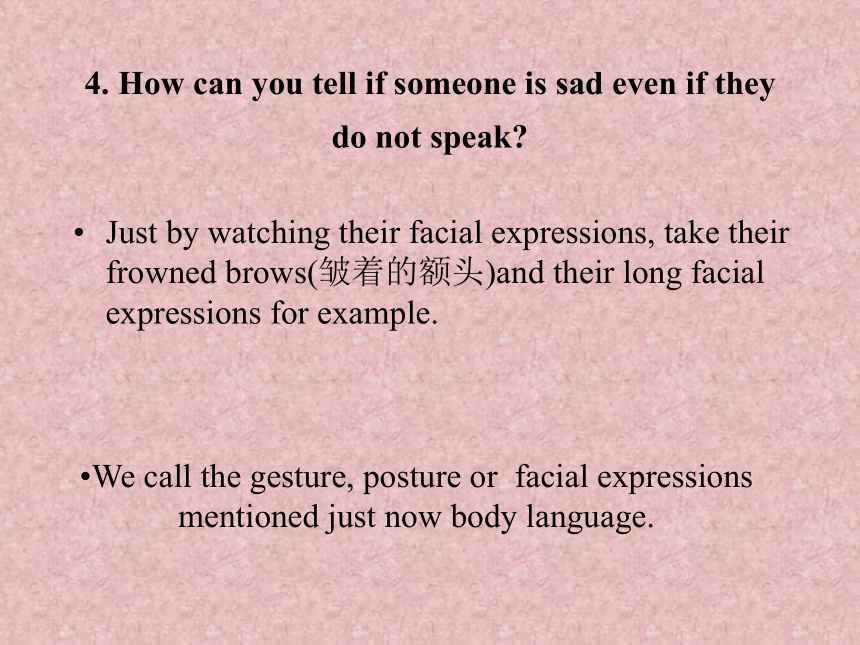
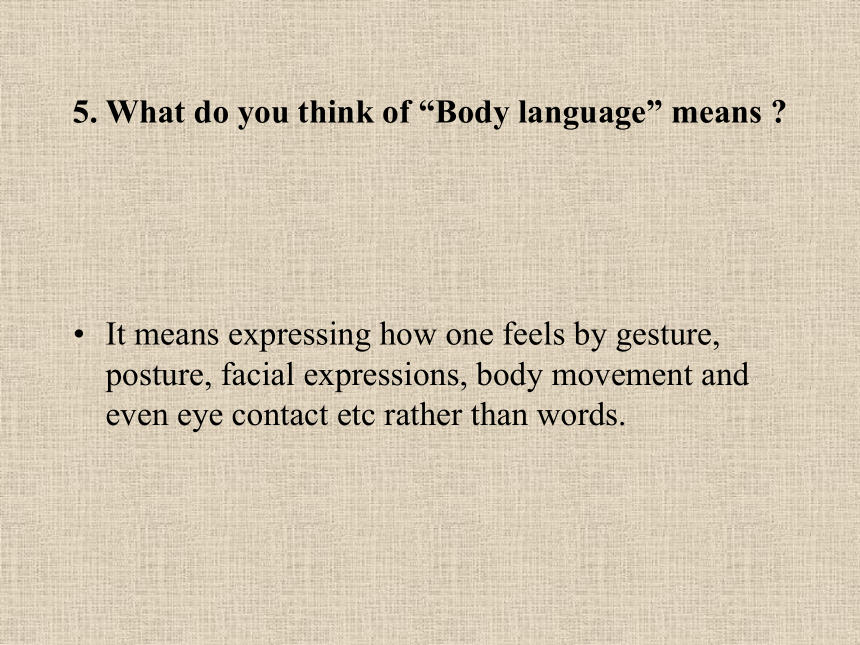
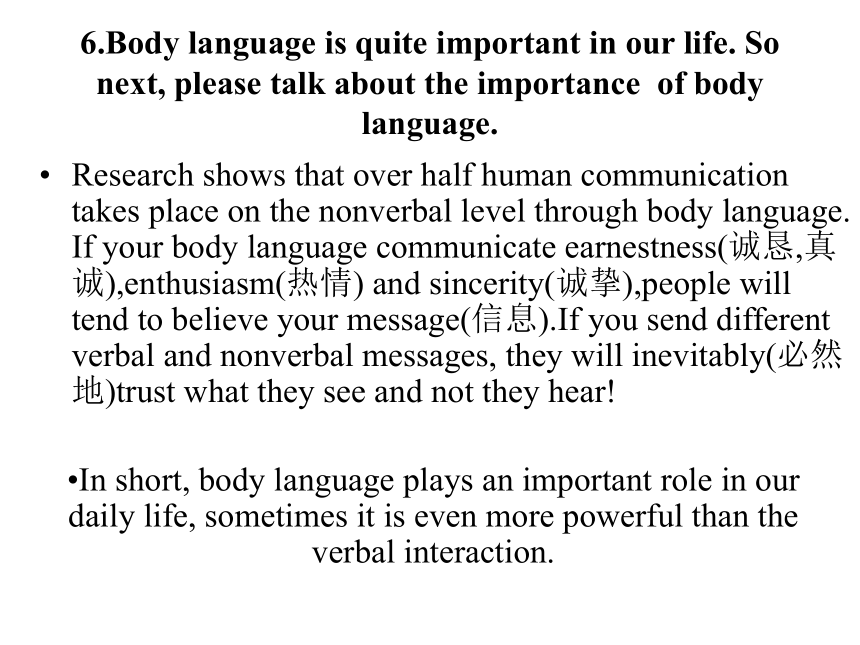
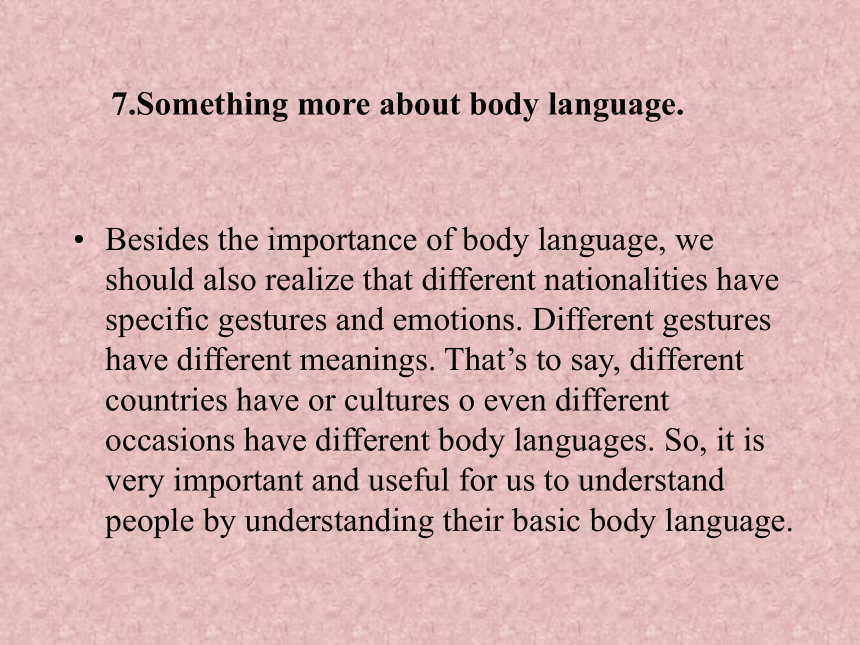
文档简介
课件27张PPT。Welcome your attendance to our Class 17,Grade 1Unit 4 Body language
(The first period---warming up & pre-reading)
By Qiufeng Mo
May 31,2005
1.When could you speak your mother language after your birth?Most of us could speak our mother language no longer after our birth, maybe one and a half or two years old.2. What is the purpose of language?The purpose of language is to communicate, namely, to exchange with others’ ideas, feelings, information, and so on.3.But when you meet someone who can’t speak your language or who can’t speak at all. How can you communicate with them?We can communicate with them by miming(哑语), by any proper postures or by gestures.4. How can you tell if someone is sad even if they do not speak? Just by watching their facial expressions, take their frowned brows(皱着的额头)and their long facial expressions for example.
We call the gesture, posture or facial expressions mentioned just now body language.5. What do you think of “Body language” means ?It means expressing how one feels by gesture, posture, facial expressions, body movement and even eye contact etc rather than words.6.Body language is quite important in our life. So next, please talk about the importance of body language.Research shows that over half human communication takes place on the nonverbal level through body language. If your body language communicate earnestness(诚恳,真诚),enthusiasm(热情) and sincerity(诚挚),people will tend to believe your message(信息).If you send different verbal and nonverbal messages, they will inevitably(必然地)trust what they see and not they hear!
In short, body language plays an important role in our daily life, sometimes it is even more powerful than the verbal interaction.7.Something more about body language. Besides the importance of body language, we should also realize that different nationalities have specific gestures and emotions. Different gestures have different meanings. That’s to say, different countries have or cultures o even different occasions have different body languages. So, it is very important and useful for us to understand people by understanding their basic body language.Greetings (Shake hands): It is not used between people of radically different status, but used between socially equal people, friends or businessman.AgreementIn China, this gesture is used in informal situations, when you reach an agreement with somebody else. In China, it is not only a gesture, but also a good wish. Each of you hopes the agreement will be long.
In Japan, this gesture means making a promise.Promise
In China, people use this gesture to make a promise.
In Japan, Japanese use this gesture to make a promise.
But in fact, we also use this gesture to make a promise nowadays in China.
Thank you!When you get benefits from others, such as other’s help, advice, and anything else you want.I wish you good fortune!Wish someone else good luck or something else.Gestures for countingNorth Chinese gesture for 4.
South Chinese gesture for 4.
In Japan, it means showing embarrassed, or wanting to appear humble when being honored.
In China, it means “I’m not sure”, and “Let me see!”.In China, we use this gesture to show” I’m not sure.” In Japan, they use this gesture to show
” I’m not sure.”
In Japan, it means money.( Make a ok sign but show your palm down.)
In most countries, it means “ok”.( Make a ok sign and show your palm up)First, it means praising somebody.
Second, it means stopping cars beside the road in western countries especially in America &England.
It means objecting somebody or refusing somebody.PracticeThink about some popular body langue around us and then act them out in pairs. One of you acts the gesture and the other guess the meaning or on the opposite.Some popular body languages around us.Wish a victory or congratulate a victory.A gesture to congratulate the victory. Some popular body languages around us.Nod head to show agreement or disagreement or goodbye or greeting..Shake hands to say goodbye.Some popular body languages around us.Gestures for happiness.A game of “ Lose & Win”( Stone, scissors & cloth)Summing upToday we learn something about body language. We know that body language is quite important in our daily life. What’s more, we know that different countries, cultures or occasions have different body languages. So we should know how to use body language appropriately. HomeworkTask1. Find more or it’s better to invent more funny body languages by yourselves after class. You’re welcome to act them out next period.
Task2. Preview the reading text with the exercise of “ Comprehending”. When previewing, please underline the difficulties in understanding the text.Thank you for your attendance again!
By Qiufeng Mo
May 31,2005
1.When could you speak your mother language after your birth?Most of us could speak our mother language no longer after our birth, maybe one and a half or two years old.2. What is the purpose of language?The purpose of language is to communicate, namely, to exchange with others’ ideas, feelings, information, and so on.3.But when you meet someone who can’t speak your language or who can’t speak at all. How can you communicate with them?We can communicate with them by miming(哑语), by any proper postures or by gestures.4. How can you tell if someone is sad even if they do not speak? Just by watching their facial expressions, take their frowned brows(皱着的额头)and their long facial expressions for example.
We call the gesture, posture or facial expressions mentioned just now body language.5. What do you think of “Body language” means ?It means expressing how one feels by gesture, posture, facial expressions, body movement and even eye contact etc rather than words.6.Body language is quite important in our life. So next, please talk about the importance of body language.Research shows that over half human communication takes place on the nonverbal level through body language. If your body language communicate earnestness(诚恳,真诚),enthusiasm(热情) and sincerity(诚挚),people will tend to believe your message(信息).If you send different verbal and nonverbal messages, they will inevitably(必然地)trust what they see and not they hear!
In short, body language plays an important role in our daily life, sometimes it is even more powerful than the verbal interaction.7.Something more about body language. Besides the importance of body language, we should also realize that different nationalities have specific gestures and emotions. Different gestures have different meanings. That’s to say, different countries have or cultures o even different occasions have different body languages. So, it is very important and useful for us to understand people by understanding their basic body language.Greetings (Shake hands): It is not used between people of radically different status, but used between socially equal people, friends or businessman.AgreementIn China, this gesture is used in informal situations, when you reach an agreement with somebody else. In China, it is not only a gesture, but also a good wish. Each of you hopes the agreement will be long.
In Japan, this gesture means making a promise.Promise
In China, people use this gesture to make a promise.
In Japan, Japanese use this gesture to make a promise.
But in fact, we also use this gesture to make a promise nowadays in China.
Thank you!When you get benefits from others, such as other’s help, advice, and anything else you want.I wish you good fortune!Wish someone else good luck or something else.Gestures for countingNorth Chinese gesture for 4.
South Chinese gesture for 4.
In Japan, it means showing embarrassed, or wanting to appear humble when being honored.
In China, it means “I’m not sure”, and “Let me see!”.In China, we use this gesture to show” I’m not sure.” In Japan, they use this gesture to show
” I’m not sure.”
In Japan, it means money.( Make a ok sign but show your palm down.)
In most countries, it means “ok”.( Make a ok sign and show your palm up)First, it means praising somebody.
Second, it means stopping cars beside the road in western countries especially in America &England.
It means objecting somebody or refusing somebody.PracticeThink about some popular body langue around us and then act them out in pairs. One of you acts the gesture and the other guess the meaning or on the opposite.Some popular body languages around us.Wish a victory or congratulate a victory.A gesture to congratulate the victory. Some popular body languages around us.Nod head to show agreement or disagreement or goodbye or greeting..Shake hands to say goodbye.Some popular body languages around us.Gestures for happiness.A game of “ Lose & Win”( Stone, scissors & cloth)Summing upToday we learn something about body language. We know that body language is quite important in our daily life. What’s more, we know that different countries, cultures or occasions have different body languages. So we should know how to use body language appropriately. HomeworkTask1. Find more or it’s better to invent more funny body languages by yourselves after class. You’re welcome to act them out next period.
Task2. Preview the reading text with the exercise of “ Comprehending”. When previewing, please underline the difficulties in understanding the text.Thank you for your attendance again!
同课章节目录
